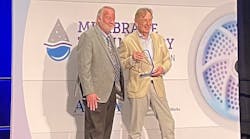Hydro Intl., a leading provider of environmentally sustainable products and innovative solutions that control and treat storm water, wastewater and combined sewer overflow, has announced a significant technology validation for the Hydro Up-Flo Filter, an advanced storm water filtration device.
The New Jersey Corporation for Advanced Technology (NJCAT), a public-private partnership, verified the storm water treatment performance capabilities of the Up-Flo Filter, which employs upflow technology to capture trash and debris and filter fine particulate matter from storm water runoff. The company’s Downstream Defender storm water separator was verified under the NJCAT laboratory testing protocols in 2005.
NJCAT verified that the Up-Flo Filter removes more than 80% total suspended solids (TSS) using Hydro-Filter-Sand (HFS) media. Laboratory test protocols and equipment were designed to mimic real field installations by using the full-scale commercially available Up-Flo Filter having up to six filter modules housed in a 4-ft-diameter structure. No other filter device verification has undergone testing that demonstrates filter performance based on multiple filter modules operating at peak filtration flow rates.
Requiring only 20 in. of driving head, the verified loading rate of the Up-Flo Filter was an unprecedented 18.2 gpm/sq ft compared to conventional filters that typically operate around 2 gpm/sq ft. Pursuant to the verification under TARP’s laboratory protocols, the Up-Flo is undergoing additional performance verification under the TARP Tier II testing protocols.
NJCAT, a public-private partnership, oversees the lengthy, rigorous verification programs required to provide guidance on the use of newly available best management practices in the environmental field. Government and private groups in the state of New Jersey and in many other states consider NJCAT’s stamp of approval a critically important credential when determining which equipment to use for storm water management projects.
NJCAT works closely with The Technology Acceptance and Reciprocity Partnership (TARP), formed by eight states to evaluate and share scientific data on technology performance of environmental protection solutions. By sharing data and standardizing testing methods, TARP aims to help agencies streamline approval processes and contractors make informed purchasing decisions. TARP member states are California, Massachusetts, Illinois, Maryland, New York, Pennsylvania, Virginia and New Jersey. Other regions such as the metropolitan areas of Atlanta and Nashville also look to TARP guidelines for guidance on new storm water management technologies.
“We’re thrilled to receive this designation from NJCAT, which is respected for its stringent level of oversight in storm water management,” said David Mongeau, general manager at Hydro Intl.’s U.S. Stormwater business. “NJCAT’s close connections with TARP will help engineering consultants in New Jersey and in states as far away as California understand the Up-Flo Filter’s benefits and how they can be leveraged during the storm water permitting process required for development and redevelopment construction.”
The Up-Flo Filter is a high-rate storm water filtration technology that removes trash, sediments, nutrients, metals and hydrocarbons from storm water runoff. As the industry’s only fluidized bed upflow filtration technology, the Up-Flo Filter provides a higher level of treatment, a higher rate of filtration, longer life of filter media and a longer maintenance cycle than other filter systems.
The NJCAT designation follows the Up-Flo Filter’s Pilot Use Level Designation earlier this year by the Washington Department of Ecology, also known for its rigorous performance verification standards.
Source: Hydro Intl.

